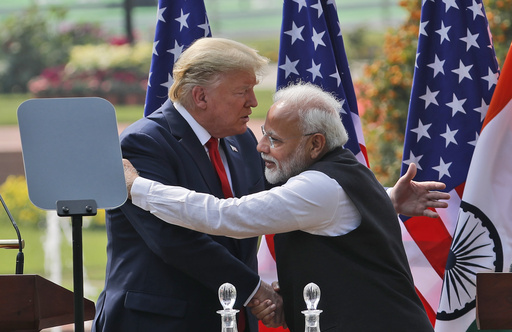
NEW DELHI — The prospect of Donald Trump returning to the White House has created a wave of anxiety among various nations, prompting many to reassess their positions relative to the United States. However, India stands out as a nation that seems to be embracing this change, which may fortify the position of nationalist leaders such as Prime Minister Narendra Modi.
India’s External Affairs Minister, Subrahmanyam Jaishankar, acknowledged the prevailing unease among several countries regarding the U.S. but clarified that India is not part of that group. He noted that Modi was among the initial leaders to personally communicate with Trump after his electoral win, emphasizing the warmth of their relationship.
Experts suggest that a second term for Trump could be advantageous for New Delhi, particularly as Modi aims to redefine India’s ties with Western nations following recent discord, which stems from his reluctance to impose sanctions on Russia or denounce its 2022 invasion of Ukraine. Additionally, Modi has faced criticism over perceived deteriorations in India’s democratic framework.
According to Michael Kugelman, the South Asia director at the Wilson Center, Trump’s victory indicates that India’s policies that have caused friction with Western nations may not be a significant concern anymore for Washington. Although issues such as trade disputes, immigration policies, and climate change objectives may arise, the overall sentiment is that “Trump’s return will enhance India’s relationship with the West,” he noted.
Modi has positioned India as an emerging global player with a burgeoning economy, capable of counterbalancing China’s influence. Nonetheless, critics argue that Modi’s authoritarian approach and the policies of his right-wing party, the Bharatiya Janata Party, have driven significant polarization within the nation, with minorities facing increasing marginalization and press freedoms under threat.
During President Joe Biden’s state visit to Modi last year, balancing concerns over human rights while pursuing new defense and technology agreements proved challenging. However, with Trump, these concerns are unlikely to arise, according to Uday Chandra, a specialist in South Asian foreign policy. He emphasized that Trump is a “refreshing reset” for India, viewing issues through a more transactional lens.
Trump’s long-standing admiration for Russian President Vladimir Putin suggests that he may be more accommodating of India’s strategic partnership with Russia, which has historical roots dating back to the Cold War, including India’s substantial purchases of Russian oil and its neutrality regarding the Ukraine conflict. Chandra believes that this was a lingering issue affecting India-U.S. relations in recent years, but under Trump, it is likely to be resolved amicably.
Trade relations may remain a contentious topic. During his first presidency, Trump frequently criticized India for its tariffs, referring to it as the “tariff king” amid disputes involving agricultural products, motorcycles, and medical devices. The imposition of a universal tariff ranging from 10% to 20% on imports and potential increases to 60% on Chinese goods could affect India, which ranks as the second-largest trading partner of the U.S. “India will have to adapt significantly to Trump’s focus on fair trade practices,” stated C Rajamohan from the Institute of South Asian Studies in Singapore.
Immigration policy could also present challenges if Trump seeks to reduce the number of skilled workers allowed into the U.S. Historically, Indians have been the largest applicants for H1-B work visas, but Trump had previously criticized the program as being unfavorable to American workers.
The collaboration on climate and clean energy initiatives may face setbacks under a Trump administration, as it is expected to align more closely with fossil fuel interests rather than green technology—potentially unraveling the progress made over the last few years, according to Milan Vaishnav from the Carnegie Endowment for International Peace.
Both Trump and Modi are known for their authoritative leadership styles, relying on passionate support bases while intensifying societal divisions to garner votes. Unlike more liberal global leaders, Trump does not see Modi’s domestic policies as problematic or worthy of concern. Kugelman notes, “They are both strong nationalists focused on making their respective countries stronger on both domestic and international fronts.”
The personal camaraderie between Trump and Modi is also notable. During Trump’s 2020 visit to India, Modi hosted an event at the world’s largest cricket stadium. Before that, at a rally in Texas, Trump had drawn parallels between Modi and music icon Elvis Presley, highlighting Modi’s significant support base. Their recent interactions reflect a close bond, with Modi sharing joyful images of their relationship online.
Chandra commented on this relationship, stating, “There’s a bromance between the two leaders, fueled by a common perspective that we now live in a post-liberal world where traditional liberal ideologies no longer function as effective frameworks for global politics.” This sentiment resonates strongly in both India and America.
